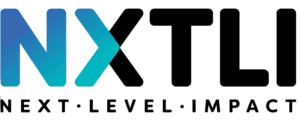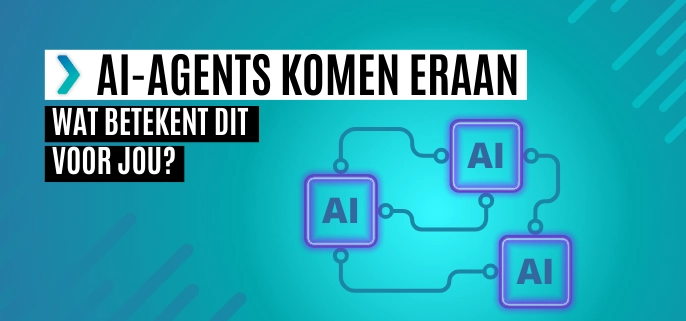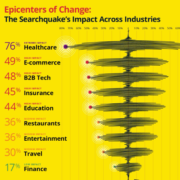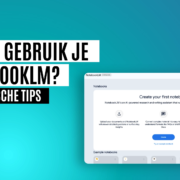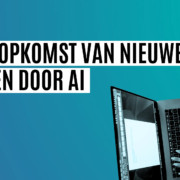AI agents are coming: how will they transform your marketing?
The next big phase of AI is just around the corner: AI agents. Just as self-driving cars automate driving from A to B, AI agents will independently take over a range of tasks. Big tech companies like Google, Microsoft and OpenAI, as well as HubSpot and Salesforce, are betting heavily on this. For example, Salesforce announced the Agentforce platform on Sept. 13, Mircosoft introduced Copilot Agents and HubSpot followed a few days later during INBOUND with the introduction of Agent.ai. What exactly are AI agents and what will this mean for your organization and marketing?
What are AI agents?
AI agents can be compared to self-driving cars, but for digital processes. Whereas AI models such as ChatGPT and Claude function as powerful "engines," AI agents are the self-driving vehicles that automate our work. With current AI tools like ChatGPT, you enter data yourself and get a result that you process further. With AI agents, it works differently: you specify what you want to achieve, your goal, and the agent does the rest, without you having to constantly take the wheel.
These agents are designed specifically for tasks within companies such as marketing automation, customer service or content creation. Each task gets its own "specialist" in the form of an AI agent, who can then also work together. For example, consider our AI colleague Pia, who creates content planning, then AI colleague Liza converts this planning into social media copywriting. In the process, even distribution to social media or posting of a blog can be automatic. For now, though, human checks absolutely remain necessary to approve and trigger the next step in the process.
It appears that opinions differ as to what falls under the heading of "AI agents," but Bret Taylor, a board member at OpenAI and co-founder of the AI agent startup Sierra, offered an interesting explanation on the subject in a recent interview. He distinguishes three different AI agents:
1. Personal agents:
- Versatile AI assistants for various daily tasks.
- Examples: Managing your inbox, creating weekly schedules, planning vacations, automatically negotiating prices, arranging complex travel arrangements, preparing meetings and optimizing your calendar.
- Future Perspective: These agents will become increasingly autonomous, being able to make decisions and take actions on your behalf.
2. Persona-based agents:
- Specialized AI, trained for specific roles or tasks.
- Examples: AI marketers developing and executing entire campaigns, AI researchers devising and analyzing scientific experiments, virtual legal assistants analyzing contracts or an AI programmer writing and debugging code.
- Future Perspective: We can expect these agents to take on increasingly complex tasks in specific domains, leading to improved service delivery, increased efficiency and cost savings.
3. Corporate agents:
- AI representatives of a brand interacting with customers.
- Examples: Chatbots that know your product catalog, provide customer service and personalized recommendations.
- Future Perspective: These agents will evolve into full-fledged digital representatives of your business. They will be able to handle complex transactions, proactively solve customer problems and even participate in product development based on customer feedback. These agents can transform the customer experience through 24/7 availability and consistent interactions.
Developments in voice and video avatars are expected to create even more natural conversations, making it seem increasingly human. This will further blur the line between digital and physical customer experiences.
AI agents will move more into the background, seamlessly integrating the technology into the devices and tools we use every day.
Also, the rise of AI will lead to innovative devices beyond the cell phone, such as advanced smart speakers or AR glasses that collaborate with AI agents.
AI agents take center stage
On Sept. 13, 2024, at the annual Dreamforce event, Salesforce announced their new platform Agentforce. This platform allows companies to build and customize AI agents focused on supporting employees and customers. These agents can perform specific tasks, such as processing customer inquiries or collecting data for analytics. This increases efficiency and improves interaction with customers.
On Sept. 16, 2024, Microsoft introduced Copilot Agents. These are agents specifically designed to automate and streamline business processes. This allows companies to use AI tailored to specific needs.
Copilot Agents can be deployed to perform complex tasks, such as managing IT tickets, HR processes and customer interactions. In addition, these agents learn from their interactions and can perform actions independently, such as preparing reports or performing approvals. With the ability to directly access corporate data through platforms such as Microsoft Dynamics 365, SharePoint and other business systems, Copilot Agents can help organizations accelerate their workflows and make them more efficient.
Companies can now build and customize their own Copilot agents to fully integrate with Microsoft 365 tools such as SharePoint, Teams and Business Chat. According to Microsoft, users of any skill level can create Copilot agents with the simple agent builder.
At HubSpot's INBOUND on Sept. 19, 2024 co-founder and CTO Dharmesh Shah gave his vision for the future of AI agents. Calling 2024 "the year of AI agents," Shah presented Agent.ai, a platform that would allow businesses easy access to customized agents. This network would enable collaboration between agents to further optimize business processes.
Sam Altman on the future of AI agents
In addition, Sam Altman, CEO of OpenAI, spoke about the next steps in AI development on Sept. 18, 2024. He explained that we are currently at the point where AI systems can not only perform tasks, but also reason. This offers huge potential for new applications, including AI agents. According to Altman, the coming months and years will bring major improvements in the capabilities of AI agents, allowing companies to better deploy this technology at scale.
In his "future vision" blog, The Intelligence Age, which he published on Sept. 23, 2024, Altman outlines a future in which AI agents will drive not only business processes but also scientific progress. He predicts that these autonomous systems will play a central role in productivity and prosperity in the coming decades. More on Sam Altman's vision for AI.
Why are AI agents a game changer?
The strength of AI agents lies in their ability to implement AI on a large scale within organizations. Currently, using tools such as ChatGPT can be cumbersome, requiring you to set up prompts yourself and manually analyze and apply results. AI agents take this work off your hands by performing tasks completely independently. This makes them easier to use for teams without AI expertise and accelerates companies' digital transformation.
AI agents are specialized and highly efficient at specific tasks, allowing companies to use AI more broadly without requiring every employee to be an expert.
How can you prepare for the arrival of AI agents?
As a marketer, you don't want to be left behind as AI agents get closer and closer. The first step is to understand how this technology can improve your daily processes. Start by identifying repetitive, time-consuming tasks within your team, such as researching, generating reports, developing content, sending personalized emails or managing customer service. These are exactly the tasks where AI agents can help through full automation.
Then you can set up small pilots where you experiment with existing AI tools. Think about the AI colleagues we can custom develop for you and platforms like Salesforce's Agentforce or HubSpot's Agent.ai. These platforms allow you to build AI agents specifically tailored to your business needs. Getting started now will ensure that you are prepared for the future possibilities of AI agents.
Another important step is to train your team on how to use this new technology. Not everyone needs to become an AI expert, but by training several colleagues in building and managing AI agents, you ensure that your organization takes full advantage of their knowledge. Ultimately, everyone on the team can use AI without having to fully understand the technology.
One example: AI agents in the production process of social media posts
Let's see how AI agents can be applied in a marketing team that needs to produce multiple social media posts weekly for different channels such as Instagram, Facebook and TikTok. This process is normally time-consuming and requires the coordination of several team members. From coming up with the content, creating visuals, writing captions, scheduling publication to measuring results. With AI agents, this entire process can be automated, saving time and resources and ensuring consistent output.
Coming up with content ideas and planning content
An AI agent trained specifically for content planning, like our AI colleague Pia, analyzes the latest trends, seasonal themes and your brand goals. The agent can automatically generate a list of post ideas that respond to current topics and appeal to your target audience. For example, for a fitness brand, the AI agent can make suggestions such as "10 quick workouts for summer" or "Healthy meal ideas for busy professionals."
Creation of visuals
After the AI agent creates the content plan, it switches to another agent who specializes in creating visuals. This agent can use a library of images and templates, combined with AI-driven design software, to create visual content that fits your brand's tone-of-voice and corporate identity. This saves the design team a tremendous amount of time, as they only have to focus on any adjustments instead of designing each visual themselves.
Writing and optimizing captions
A third AI agent, such as our AI colleague Liza, for example, can create the corresponding texts or captions for each social media post, tailored to the platform (for example, shorter, direct texts for Twitter and more elaborate, informative content for LinkedIn). This agent takes into account the right keywords and hashtags to maximize the visibility of the posts, without you or your team having to do it manually.
Scheduling and publishing
A publishing agent can then schedule posts at the right times, taking into account analytics from previous results and the optimal time to reach your target audience. This means you no longer have to spend time manually scheduling and posting.
Analyze and optimize
Finally, an analytics agent can monitor the performance of social media posts and report directly on what is working well and where improvements can be made. This agent collects data such as impressions, engagement, click rates and conversions, and can even automatically suggest adjustments for future posts based on these insights.
Explosion of AI agents in 2025-2026
Although the development of AI agents is rapid, it is not yet to the point where they can perform every step of complex processes completely independently. The technology is really already very advanced, but perfectly functioning AI agents that accurately perform all tasks without human intervention are not expected to be widely deployable until 2025-2026. An explosion of AI agents is also expected during that period.
In recent months we have gained a lot of experience training our AI colleagues. To get good consistent results really still proved to be quite a challenge. Human checks and fine-tuning is definitely still needed at this point.
Use the coming period to properly prepare for this development. Decide what tasks and work you will begin with and start a period of testing and refinement. Then, with ever-improving technology and capabilities, AI agents can gradually take over more and more responsibilities. For now, human input remains essential for quality control, fine-tuning and strategic decisions, but this will become less necessary over time.
Invitation to monthly AI inspiration sessions
We would love to take a look at the most important AI developments with you, discuss the latest news and updates, share experiences, give you concrete tools, you can ask questions and spar with us.
Do you enjoy being a part of this as well? Then sign up.

